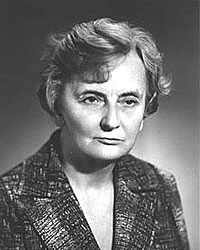Aušra Augustinavičiūtė
Aušra Augustinavičiūtė (pseudonym: Augusta ; born April 4, 1927 in Kaunas , Lithuania ; † August 19, 2005 ) was a Lithuanian psychologist, sociologist and economist, author of various scientific works and founder of socionics .
education
Aušra Augustinavičiūtė was born in 1928 as the daughter of a publisher near Kaunas in Lithuania. In 1953 she received her doctorate in economics from the Faculty of Economics at Vilnius University , first worked in the Ministry of Finance of the Lithuanian SSR and later as a teacher of political economy at various educational institutions in Vilnius .
Justification of socionics
In the 1960s and 1970s, Aušra Augustinavičiūtė, as a sociologist and psychologist and head of the Faculty of Marriage and Family at the Vilnius Pedagogical University, developed a model that classifies people and, with the help of this classification, was supposed to predict the relationship between different people. Aušra Augustinavičiūtė suggested the name " socionics " for her theory , as А.Augustinavičiūtė, as a sociologist and psychologist, was convinced that every personality type fulfills a special function in society that can be described and explained with the help of socionics. Applying Antoni Kępiński's theory of information exchange , the principles of cybernetics and computer science to the typology of CGJung, socionics emphasizes and describes certain variants of information exchange between subjects depending on their characteristic personality types, also known as "type of information exchange" (TIM ), or "Socionic Type". From CG Jung's theory of psychic functions, socionics deduces the existence of 16 such types, as a result of various combinations of eight psychic functions, which are regarded as "functions of information exchange", each of which perceives and has its own separate, specific type of information processed.
That was the hour of birth of socionics - a psychological model similar to the MBTI , but developed independently of it. She describes herself in the model as ENTp (intuitive-logically extroverted).
swell
- ↑ Аугустинавичюте А. (1996). Социон, или Основы соционики. Соционика, ментология и психология личности, 4-5. (In Russian. Title can be translated as Augustinavichiute A. (1996). The Socion, or Socionics Basics. Socionics, Mentology, and Personality Psychology, 4-5).
- ^ Antoni Kępiński . Melancholy. Меланхолия.— М .: Наука, 2002. - 405 стр. ISBN 5-02-024984-X
- ↑ Аугустинавичюте А. (1996). Социон, или Основы соционики. Соционика, ментология и психология личности, 4-5. (In Russian. Title can be translated as Augustinavichiute A. (1996). The Socion, or Socionics Basics. Socionics, Mentology, and Personality Psychology, 4-5).
- ↑ Fink G. and Mayrhofer W. Cross-cultural competence and management ( Memento from December 6, 2012 in the web archive archive.today ) - setting the stage // European J. Cross-Cultural Competence and Management. - 2009. - Vol. 1. - No. 1.
-
↑ Blutner R., Hochnadel E .: Two qubits for CG Jung's theory of personality . In: Cognitive Systems Research . 11, No. 3, 2010, pp. 243-259 [http: //blutner.de/Documents/Jung_rev.pdf].
"Socionics was developed in the 1970s and 1980s mainly by the Lithuanian researcher Ausra Augustinaviciute. The name 'socionics' is derived from the word' society, since Augustinaviciute believed that each personality type has a distinct purpose in society, which can be described and explained by socionics. The system of socionics is in several respects similar to the MBTI; however, whereas the latter is dominantly used in the USA and Western Europe, the former is mainly used in Russia and Eastern Europe. For more information, the reader is referred to the website of the International Institute of Socionics and to several scientific journals edited by this institution (see http://socionic.info/en/esocjur.html#top ). Despite of several similarities there are also important differences. For instance, the MBTI is based on questionnaires with so-called forced-choice questions. Forcedchoice means that the individual has to choose only one of two possible answers to each question. Obviously , such tests are self-referential. That means they are based on judgments of persons about themselves. Socionics rejects the use of such questionnaires and is based on interviews and direct observation of certain aspects of human behavior instead. However, if personality tests are well constructed and their questions are answered properly, we expect results that often make sense. For that reason, we do not reject test questions principally, but we have to take into account their self-referential character. Another difference relates to the fact that socionics tries to understand Jung's intuitive system and to provide a deeper explanation for it, mainly in terms of informational metabolism (Kepinski & PZWL, 1972). Further, socionics is not so much a theory of personalities per se, but much more a theory of type relations providing an analysis of the relationships that arise as a consequence of the interaction of people with different personalities. "
| personal data | |
|---|---|
| SURNAME | Augustinavičiūtė, Aušra |
| ALTERNATIVE NAMES | Augusta, Aushra; Аушра Аугустинавичуте |
| BRIEF DESCRIPTION | Lithuanian psychologist and economist and founder of socionics |
| DATE OF BIRTH | April 4, 1927 |
| PLACE OF BIRTH | Kaunas , Lithuania |
| DATE OF DEATH | August 19, 2005 |
